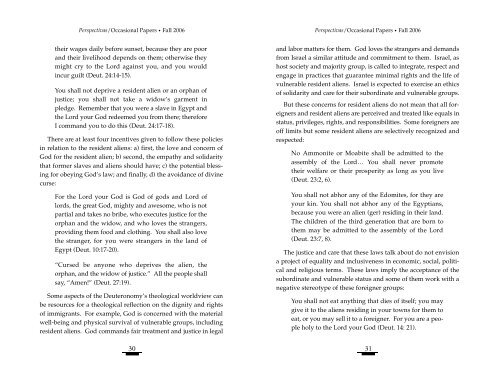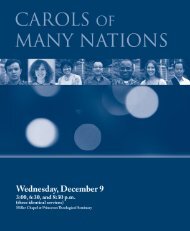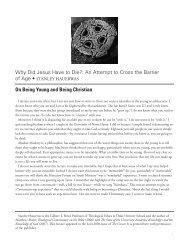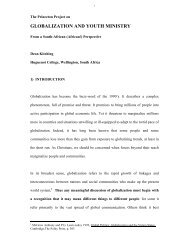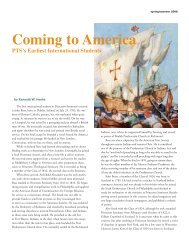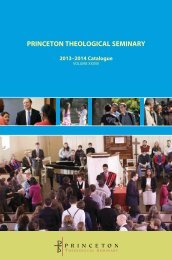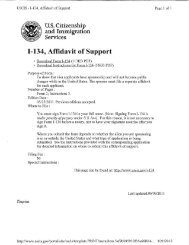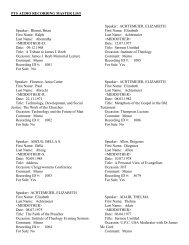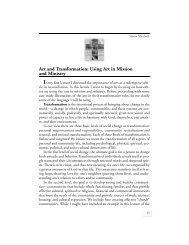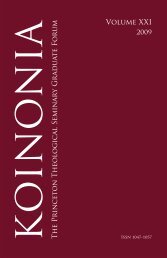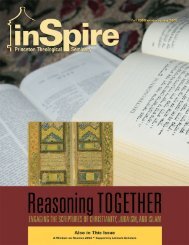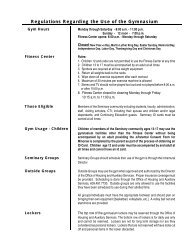P E R S P E C T I VAS - Princeton Theological Seminary
P E R S P E C T I VAS - Princeton Theological Seminary
P E R S P E C T I VAS - Princeton Theological Seminary
You also want an ePaper? Increase the reach of your titles
YUMPU automatically turns print PDFs into web optimized ePapers that Google loves.
Perspectivas/Occasional Papers • Fall 2006Perspectivas/Occasional Papers • Fall 2006their wages daily before sunset, because they are poorand their livelihood depends on them; otherwise theymight cry to the Lord against you, and you wouldincur guilt (Deut. 24:14-15).You shall not deprive a resident alien or an orphan ofjustice; you shall not take a widow’s garment inpledge. Remember that you were a slave in Egypt andthe Lord your God redeemed you from there; thereforeI command you to do this (Deut. 24:17-18).There are at least four incentives given to follow these policiesin relation to the resident aliens: a) first, the love and concern ofGod for the resident alien; b) second, the empathy and solidaritythat former slaves and aliens should have; c) the potential blessingfor obeying God’s law; and finally, d) the avoidance of divinecurse:For the Lord your God is God of gods and Lord oflords, the great God, mighty and awesome, who is notpartial and takes no bribe, who executes justice for theorphan and the widow, and who loves the strangers,providing them food and clothing. You shall also lovethe stranger, for you were strangers in the land ofEgypt (Deut. 10:17-20).“Cursed be anyone who deprives the alien, theorphan, and the widow of justice.” All the people shallsay, “Amen!” (Deut. 27:19).Some aspects of the Deuteronomy’s theological worldview canbe resources for a theological reflection on the dignity and rightsof immigrants. For example, God is concerned with the materialwell-being and physical survival of vulnerable groups, includingresident aliens. God commands fair treatment and justice in legal30and labor matters for them. God loves the strangers and demandsfrom Israel a similar attitude and commitment to them. Israel, ashost society and majority group, is called to integrate, respect andengage in practices that guarantee minimal rights and the life ofvulnerable resident aliens. Israel is expected to exercise an ethicsof solidarity and care for their subordinate and vulnerable groups.But these concerns for resident aliens do not mean that all foreignersand resident aliens are perceived and treated like equals instatus, privileges, rights, and responsibilities. Some foreigners areoff limits but some resident aliens are selectively recognized andrespected:No Ammonite or Moabite shall be admitted to theassembly of the Lord… You shall never promotetheir welfare or their prosperity as long as you live(Deut. 23:2, 6).You shall not abhor any of the Edomites, for they areyour kin. You shall not abhor any of the Egyptians,because you were an alien (ger) residing in their land.The children of the third generation that are born tothem may be admitted to the assembly of the Lord(Deut. 23:7, 8).The justice and care that these laws talk about do not envisiona project of equality and inclusiveness in economic, social, politicaland religious terms. These laws imply the acceptance of thesubordinate and vulnerable status and some of them work with anegative stereotype of these foreigner groups:You shall not eat anything that dies of itself; you maygive it to the aliens residing in your towns for them toeat, or you may sell it to a foreigner. For you are a peopleholy to the Lord your God (Deut. 14: 21).31


